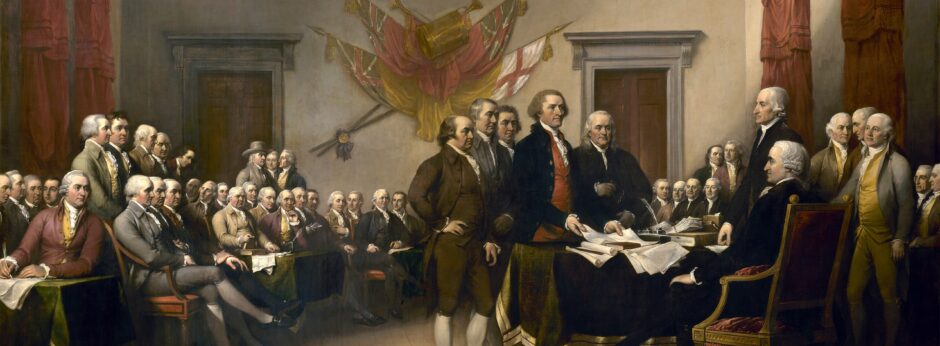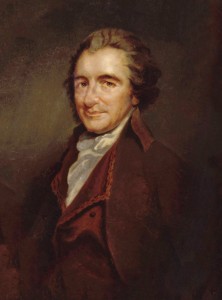Who declared American Independence? The answer is not quite as simple as it appears. Gordon Wood relates how some observers remarked later that Sam Adams of Boston had at least decided on independence as early as 1768, following enactment of the Townshend Duties. One thing is clear in Wood’s account of the movement from resistance to rebellion –there was a real sense of American Independence readily apparent by 1774. That was the year of the Coercive Acts and what Wood characterizes as “open rebellion in America.” Students in History 117 should be able to identify a variety of ways that the authority of the British imperial system quite literally fell apart in the American colonies during the period from 1774 to 1775. Yet still, there was no “declared” independence until the summer of 1776. Nonetheless, it is not enough to simply reward the credit for American Independence to the decision-making of the Second Continental Congress and the prose of Thomas Jefferson. According to Wood, it was Tom Paine, more than any other figure, who most fully expressed “the accumulated American rage against George III.” Students might benefit from studying this rage in Paine’s sensational pamphlet, Common Sense (1776) or by analyzing its influence on the “long train of abuses” which dominate the second half of the Declaration of Independence. Yet regardless of how exactly independence got declared, or how to explain the ideology which lay behind it, one Founder who was noticeably reluctant about embracing this revolutionary step was John Dickinson, the famous pamphleteer. Dickinson warned his colleagues on July 1, 1776 that with their declaration that they would be attempting to “brave the storm in a skiff made of paper.” Dickinson soon came around to the cause, but his fears remained a recurring concern for many. Securing independence proved even far more challenging than declaring it.
Matthew Pinsker
Office: House Divided studio
(61 N. West Street)
Office Hours: Wed 10am to 1pm
Email: pinskerm@dickinson.eduAdministration


After reading the chapter on Paine one thing that really stood out to me was the discussion/debate on whether Paine should be characterized as a revolutionary figure for the American Revolution. Wood argues both sides in the chapter covering Paine. Wood talks about how Paine wrote the most important document for the revolution, but yet still to this day his name isn’t thrown around with the names such as Thomas Jefferson and George Washington. Why is this? Well after reading Wood’s chapter on Paine it seems to me that even Paine wouldn’t classify himself as an American figure. The key word here is American. Yes, Paine is a very influential revolutionary figure due to his pamphlets being directed towards the working class, but he is not specifically only an American Revolutionary. Paine even said he is not a citizen of a specific nation, but rather a citizen of the world. Therefore, in my opinion Paine was an opportunistic. Someone that believed strongly in what he wrote, and used every opportunity to write and distribute pamphlets on his beliefs. Paine may loose some awe factor and even loose is classification of being an American Revolutionary due to this, but he still is a very important person in the American Revolution time period.